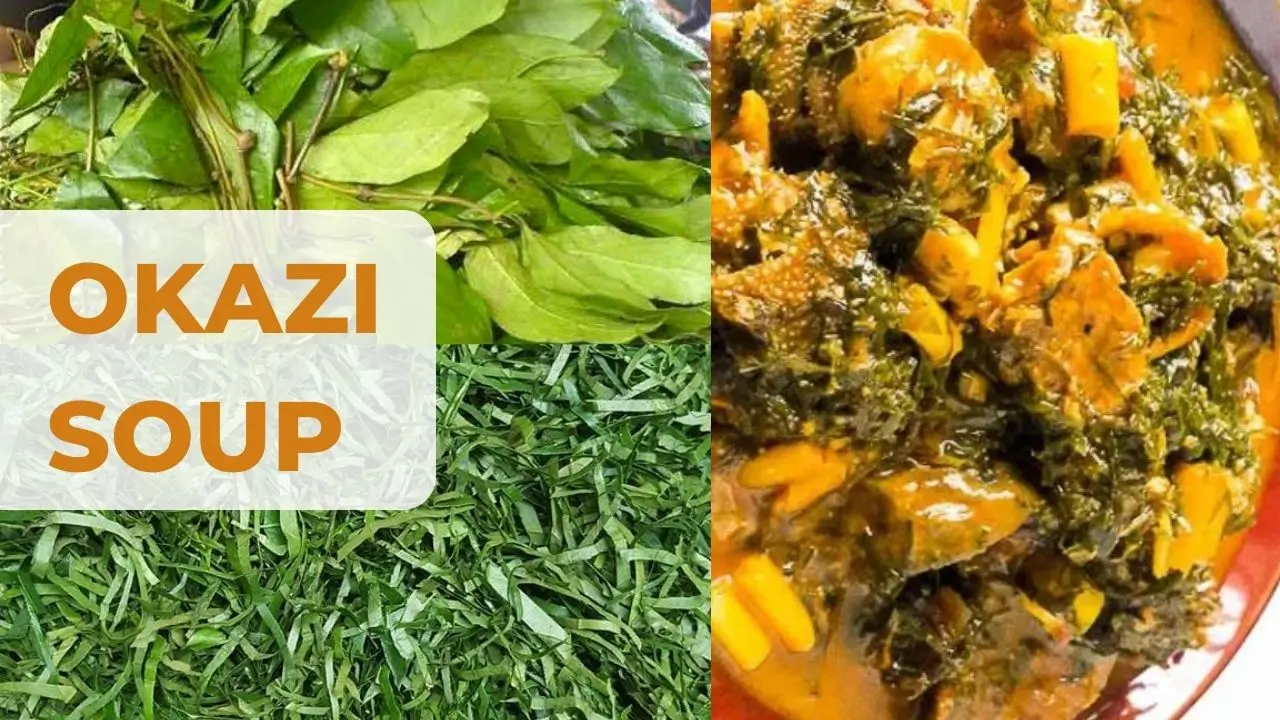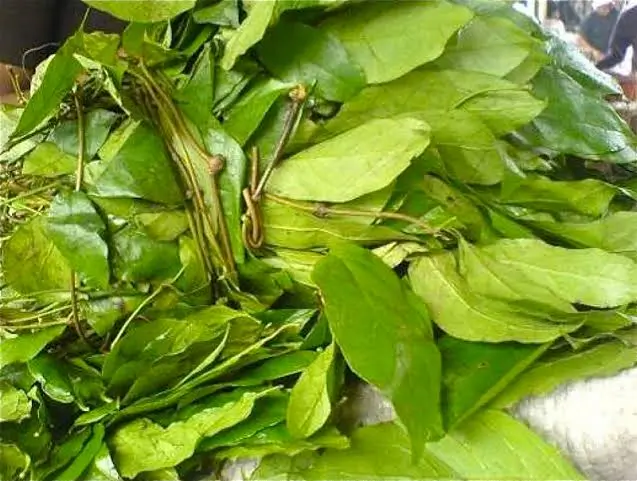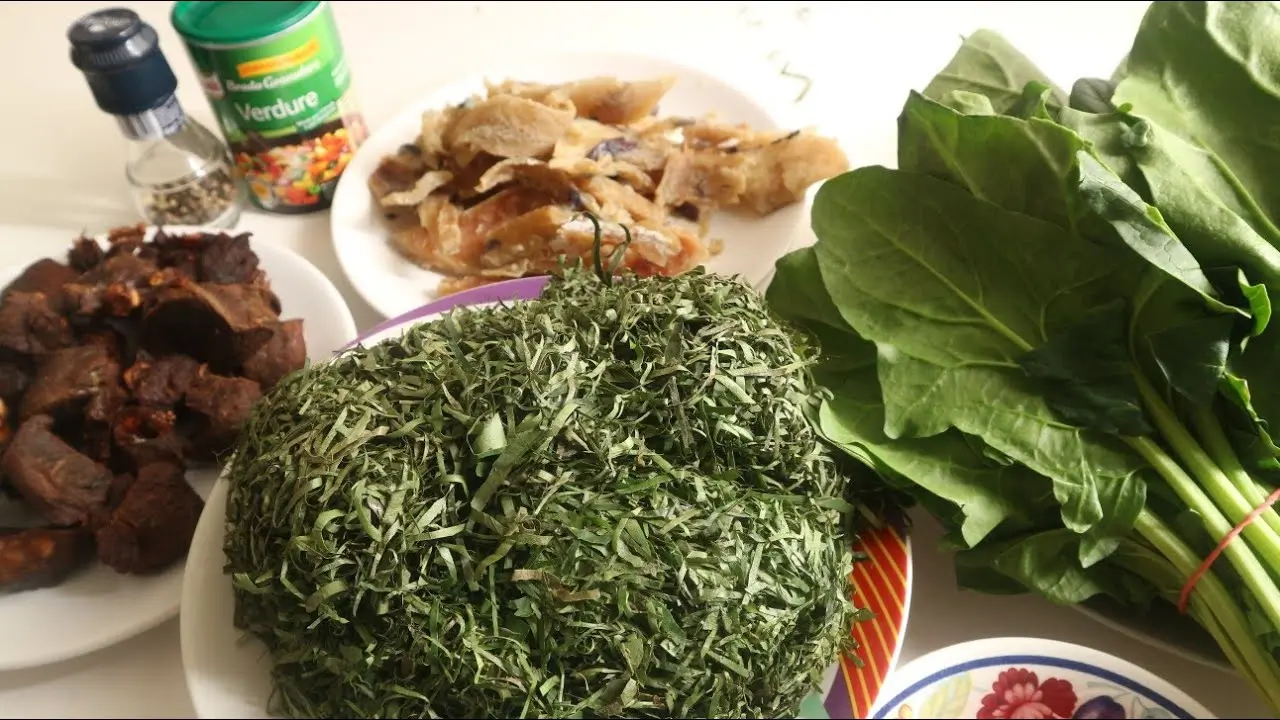Okazi soup, or Ukazi soup, also known as Wild Flower Soup, is a delicious and nutritious vegetable soup from the Igbo people of eastern Nigeria. The soup is prepared with Okazi leaves, which are also called wild spinach (English), Afang (Efik or Ibibio), or eru leaves (Yoruba). Okazi leaves are dark green and slightly bitter, adding a unique flavour and texture to the soup.
You should try this soup once in your life, and you will like it. The soup is not just tasty; it is highly nutritious and beneficial to your health.
In this article, you will learn more about Okazi soup, its history and origin, its benefits for your health, its ingredients, how to cook it, and how to enjoy it. You will also find answers to some frequently asked questions about Okazi. So, if you’re ready to learn everything about this Igbo delicacy, continue reading!
What Is Okazi (Wild Spinach) Soup?
Ukazi Soup is a vegetable soup that is made with Okazi leaves as the main ingredient. Okazi leaves are also known as wild spinach because they belong to the same family as spinach (Amaranthaceae). However, they are not the same as spinach that you buy in the market or grow in your garden.
Okazi leaves have a slightly bitter taste that some people may find unpleasant at first. However, once you get used to it, you will appreciate its unique flavour and aroma. It also blends well with other ingredients in the soup, such as meat, fish, crayfish, palm oil, pepper, and seasonings. The soup is also thickened with achi, ofo, or ukpo, which are different types of starches that come from plants such as cocoyam, cassava, or pumpkin. These thickeners give the soup a smooth and creamy consistency that makes it more satisfying and filling.
Okazi soup is a popular dish in Igbo land, especially in Abia, Anambra, Ebonyi, Enugu, and Imo states. It is also enjoyed by other ethnic groups in Nigeria, such as the Efik and Ibibio people of Akwa Ibom and Cross River states, who call it Afang soup. The soup is often served with swallow foods, such as eba, pounded yam, fufu, semolina, amala, wheat meal, or tuwo masara.
History and Origin of Okazi (Wild Spinach)
Okazi leaves have been used as food and medicine for centuries by various ethnic groups in Africa and Asia. They are native to the tropical forests of these regions, where they grow as vines on trees. They are also cultivated in some areas, such as Cameroon, Nigeria, Gabon, Congo, and Angola. They are harvested by cutting the stems and leaves from the vines and then drying them in the sun or over a fire. They can be stored for a long time without losing their nutritional value or flavour.
Okazi leaves have been a staple food for many people in eastern Nigeria, especially the Igbo people. They have been using them to make okazi soup for generations. The soup is a traditional dish that is served on special occasions, such as weddings, festivals, ceremonies, and celebrations. It is also an everyday meal that is eaten at home or in restaurants. It is considered a delicacy and a sign of wealth and hospitality.
Okazi soup is also enjoyed by other ethnic groups in Nigeria, such as the Efik and Ibibio people of Akwa Ibom and the Cross River states. They call it afang soup, which means “soup of afang” in the Efik language. Afang is another name for Okazi leaves in their dialect. The soup is similar to Okazi soup, but it has some variations in the ingredients and preparation. For example, afang soup usually contains more water leaves than okazi leaves, and it is cooked for a shorter time than okazi soup.
Benefits of Eating Okazi Soup
Okazi is not only delicious but also nutritious. It has many benefits for your health and well-being. Here are some of the benefits of eating okazi soup:
- It provides you with essential vitamins and minerals. Okazi leaves are rich in vitamin A, vitamin C, vitamin K, calcium, iron, potassium, magnesium, zinc, and copper. These nutrients help to boost your immune system, protect your eyesight, support your bone health, prevent anaemia, regulate your blood pressure, maintain your nerve and muscle function, and promote wound healing.
- It helps you lose weight. Okazi leaves are low in calories but high in fibre. Fibre helps keep you full for longer and reduces your appetite. It also helps to lower your blood sugar and cholesterol levels and prevent constipation and digestive problems. The soup also has a low glycemic index (GI), which means it does not cause a spike in your blood sugar after eating it.
- It protects you from diseases. Okazi leaves have anti-inflammatory, anti-bacterial, anti-fungal, anti-viral, anti-parasitic, anti-cancer, and anti-diabetic properties. They help to fight infections, inflammation, parasites, tumours, and diabetes.
List of Ingredients for Okazi Soup
To make Ukazi soup, you will need the following ingredients:
- okazi leaves
- water leaves, ugu leaves, or uziza leaves (optional)
- Assorted meat (beef, goat, chicken, etc.)
- Stock fish (Optional
- Dry fish (Optional)
- Crayfish
- Palm oil
- Achi, ofo, or ukpo (thickener)
- 2 seasoning cubes
- Salt and pepper to taste
How to Cook Okazi Soup
To cook okazi soup, follow these steps:
Step 1: Prepare the meat and stockfish
- Wash and cut the beef into tiny-sized pieces.
- Rinse the stockfish head and soak it in hot water for about 10 minutes to soften it.
- Place the meat and stockfish in a large pot and add enough water to cover them.
- Add one seasoning cube, salt, and pepper to taste.
- Boil and cook until the meat and stockfish are tender.
Step 2: Prepare the dry fish and palm oil
- Wash and debone the dry fish and break it into small pieces.
- Heat the palm oil in a small pot over low heat until it melts.
- Add the crayfish and stir-fry for about 5 minutes.
Step 3: Add the thickener and seasonings
- Dissolve the achi, ofor, or ukpo in some water and add it to the pot of meat and stockfish.
- Stir well and cook for about 10 minutes until the soup thickens.
- Add the remaining seasoning cube, salt, and pepper to taste.
Step 4: Add the okazi leaves and water leaves
- Rinse and slice the okazi leaves. Or pound them in a mortar if you like.
- Rinse and chop the water leaves, Ugu leaves, or Uziza leaves if you’re using any.
- Add the okazi leaves and water leaves to the soup and stir well.
- Allow to cook for about 5 minutes until the vegetables are soft but not overcooked.
How to Enjoy/Eat Okazi Soup
Okazi soup is best enjoyed with swallow foods such as eba, pounded yam, fufu, semolina, amala, wheat meal, or tuwo masara.
Okazi Soup and Pregnant Women
Okazi soup is generally safe and healthy for pregnant women. It provides them with essential nutrients that support their health and that of their unborn babies. However, pregnant women should take precautions when eating the soup. Here are some tips for pregnant women who want to eat okazi soup:
- Avoid overeating Ukazi soup, as it may cause indigestion or heartburn due to its high fibre content.
- Avoid eating too-spicy Ukazi soup, as it may irritate your stomach or cause nausea or vomiting.
- Avoid eating too much oily Ukazi soup, as it may increase your cholesterol level or cause weight gain.
- Avoid eating spoiled or contaminated soup, as it may cause food poisoning or infections that may harm you or your baby.
Consult your doctor before eating Ukazi soup if you have any medical conditions or allergies that may affect your pregnancy.
So, if you’re wondering, is Okazi soup good for a pregnant woman? The answer is Yes. Okazi soup is generally good for a pregnant woman. It provides her with essential nutrients that support her health and that of her unborn baby.
Okazi Soup Tribe
Okazi soup is a popular dish in Igbo land, especially in Abia, Anambra, Ebonyi, Enugu, and Imo states. It is also enjoyed by other ethnic groups in Nigeria, such as the Efik and Ibibio people of Akwa Ibom and Cross River states, who call it Afang soup.
Frequently Asked Questions
What is the English Name of Okazi Leaves?
Okazi leaves are also called wild spinach in English. However, they are not the same as spinach that you buy in the market or grow in your garden. They are actually a different species of plant called Gnetum africanum. They have a distinctive shape and texture that make them different from spinach.
What Is Okazi Soup Made Of?
Okazi is made of okazi leaves, which are the main ingredient. It is also made of assorted meat, stockfish, dry fish, crayfish, palm oil, achi, ofo, or ukpo (thickener), seasoning cubes, salt, and pepper. Some people also add water leaves, ugu leaves, or uziza leaves for the taste and look of the soup.
How Long Does Okazi Soup Last?
Okazi soup can last for up to three days if stored properly in the refrigerator or freezer. To store Ukazi soup in the fridge or freezer, follow these steps:
- Let the soup cool down completely before storing it.
- Transfer the soup to an airtight container
- Place the container in the refrigerator or freezer.
- Reheat the soup in a pot over low heat or microwave it before eating it.
Can I Use Spinach Instead of Water Leaves?
Yes, you can use spinach instead of water leaves to make Ukazi soup. Spinach is a good substitute for water leaves because they have a similar taste and texture. However, spinach may not be as juicy as water leaves.
What Is the Difference Between Afang and Okazi Soup?
Afang soup and okazi are similar soups that are made with okazi leaves. However, they have some differences in the ingredients and preparation. For example, afang soup usually contains more water leaves than okazi leaves, while ukazi soup usually contains more okazi leaves than water leaves.
Conclusion
Okazi soup is a delicious and nutritious vegetable soup that is made with okazi leaves, also known as wild spinach. It is a traditional dish that is popular among the Igbo people of eastern Nigeria. It is also enjoyed by other ethnic groups in Nigeria, such as the Efik, Ibibio, and Yoruba people. Okazi soup has many benefits for your health and well-being.
It provides you with essential vitamins and minerals, helps you lose weight, and protects you from diseases. It is also easy to cook and can be eaten with various accompaniments. Okazi soup is a dish that you should try if you want to experience the rich and diverse culture and food of the Igbo people and Nigeria.






